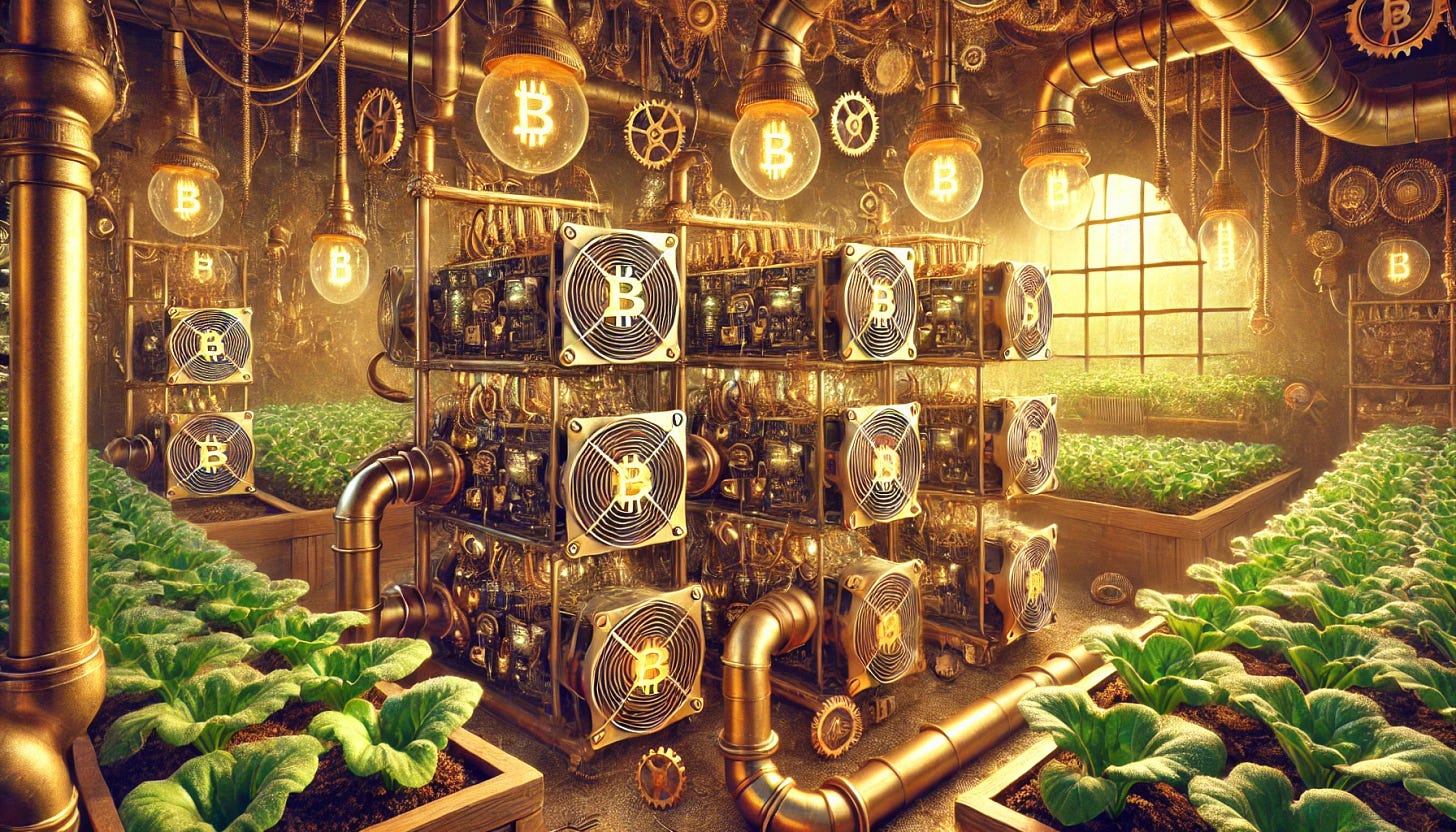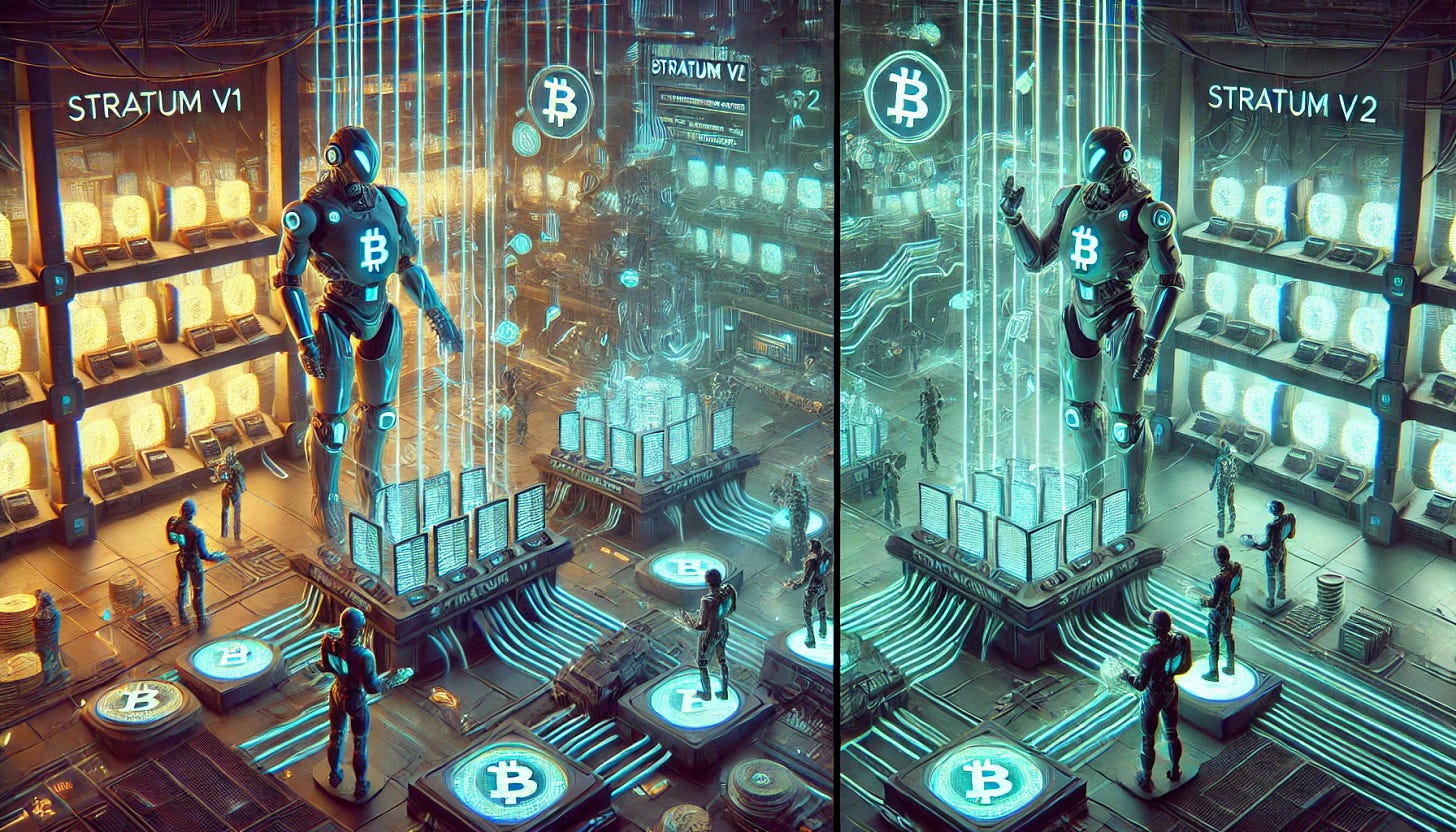Decentralization Of Bitcoin
But Wasn't Bitcoin Already Decentralized?
Bitseed Sci-Fi Episode – The Miner Capitulation and Stratum V2 Revelation
A conversation between Alexandra and Don Miguel, set in a near-future decentralized Bitcoin mining outpost.
Scene: The Bitseed Citadel – A Remote Off-Grid Mining Collective
The room hums with the low-frequency vibration of Bitcoin ASIC miners, their exhaust heat carefully redirected into a greenhouse filled with lush food crops. Alexandra sits at a reclaimed wood desk, analyzing a real-time mining dashboard on an old ThinkPad. Don Miguel, clad in a rugged jacket, enters, shaking off the chill from outside.
Alexandra (grinning, tapping the screen):
"Well, well. Look at this… Miner capitulation is in full swing. The hash ribbon just flashed red. I think I am right assuming this; the hashrate of the Bitcoin network refers to the total computational power being used to mine and process transactions. It is measured in hashes per second (H/s) and typically expressed in terahashes per second (TH/s) or exahashes per second (EH/s).”
Don Miguel (raising an eyebrow):
"Yes that is correct and capitulation, huh? Looks like some of the weaker hands are being forced out. The 30-day hashrate just dipped below the 60-day. That means some miners can’t afford to stay in the game."
Alexandra (nodding):
"Yes. It’s like the cycles of nature—prune the weak branches, and the tree grows back stronger. But the real question is, what does this mean for decentralization? Who’s going to fill the void?"
Don Miguel (pulling up a chair):
"Historically, after every miner capitulation, Bitcoin hashrate consolidates for a while, but then—bam!—new players step in, usually those who figured out how to run ASICs on near-zero-cost energy. Waste methane, micro-hydro, even heat-recycling rigs like we’re running here."
Alexandra (gesturing toward the greenhouse):
"Exactly. You know, that’s what gives me hope. The centralization of mining has been a problem for years. The big public mining companies hoard the hash power, and pools control transaction selection. But that’s starting to change… especially with Stratum V2."
Don Miguel (smirking):
"Ah, Stratum V2. The protocol upgrade Satoshi would have wanted if they were still around."
Alexandra (leaning forward):
"No kidding. Remember how we used to be stuck with Stratum V1? The mining pools picked all the transactions, meaning they could censor anything they wanted. We were just hashrate slaves, solving blocks for them."
Don Miguel (laughing):
"Right! That old setup was ripe for abuse. A government could pressure a few major mining pools to block transactions from certain wallets. But with Stratum V2, we miners finally choose the transactions. The pools only aggregate our work, not control it."
Alexandra (grinning):
"And let’s not forget the efficiency gains—half the bandwidth usage, encrypted communications so no one hijacks our hashrate, and the ability to mine in places where connectivity is a joke. Our off-grid rigs? They’re thriving because of it."
Don Miguel (gesturing to the miners):
"It’s funny. Stratum V1 helped Bitcoin scale back when pools first emerged, but it ended up centralizing things. Now, Stratum V2 is undoing that centralization—kind of like how Bitseed is changing the way we think about seed distribution."
Alexandra (smirking):
"Exactly. Everything in cycles. Bitcoin had its centralization phase, but the pendulum is swinging back toward decentralization. The same way industrialized agriculture choked out local seed diversity, only for permaculture and seed sovereignty to fight back."
Don Miguel (sitting back, thoughtful):
"So, let’s say we keep moving in this direction. Decentralized pools like Ocean, miners running on bio-waste energy, even DIY home mining collectives—where does it all lead?"
Alexandra (excited):
"It leads to resilience. Imagine a world where mining is as common as growing your own food. Local communities power their economies with Bitcoin mined from solar, wind, flared gas, hydro—hell, even algae bioreactors! No middlemen. No gatekeepers. Just people securing the network."
Don Miguel (smiling, raising a cup of tea):
"A future where energy waste is minimized, censorship is impossible, and control is returned to individuals? Now that… that is a Bitcoin future worth mining for."
The ASICs continue their steady hum as the greenhouse plants bask in the recycled heat. Outside, beyond the citadel walls, a new era of decentralized Bitcoin mining is just beginning. And despite all the FUD very successfully spread around by mainstream media, Bitcoin is slowly proving such FUD as largely BS!
Themes Explored in the Dialogue:
✅ Miner Capitulation: The natural cycle of weak miners exiting, making way for new, more efficient setups.
✅ Stratum V2: How it decentralizes mining by allowing miners to select transactions instead of pools.
✅ Energy Efficiency: Leveraging waste methane, micro-hydro, bio-waste, and heat recycling to mine more profitably.
✅ Bitcoin & Permaculture Parallels: The cycle of centralization → decentralization in both Bitcoin mining and agriculture.
✅ Future Vision: A world where small, localized mining operations empower communities, free from corporate or state control.
This conversation sets the stage for a decentralized mining revolution, mirroring Bitseed’s broader theme of regenerative, resilient, self-sufficient systems.
Thanks as always for following our Bitseed journey.



